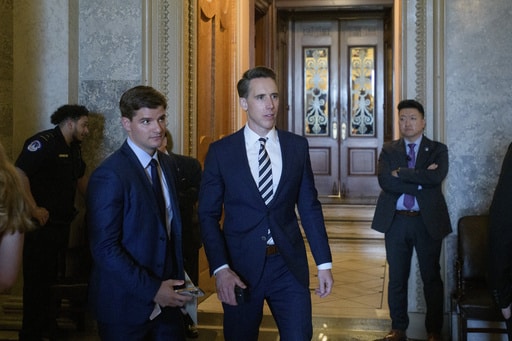In a wave of political discord, President Donald Trump voiced his displeasure with Republican Senator Josh Hawley on Wednesday after Hawley’s proposal to restrict stock trading by not only members of Congress but also the president and vice president received committee approval. This marks the second consecutive day of Trump’s public grievances against GOP senators, as he attempts, albeit with mixed success, to sway them to his side. Just a day earlier, Trump criticized Iowa’s veteran Senator Chuck Grassley over a lesser-known Senate procedure concerning nominations.
Trump tagged Hawley as a “second-tier Senator,” suggesting that he was empowering Democrats with his actions. In a firm statement, Trump declared, “I don’t think real Republicans want to see their President, with such unprecedented success, TARGETED because of the ‘whims’ of a second-tier Senator named Josh Hawley!” Despite collaborative efforts between Republican senators and the White House to discuss exclusions within the stock trade bill—specifically to exempt the president—a key amendment proposing such a carve-out was blocked; Hawley voted against it alongside Democrats.
Trump further accused Hawley of siding with Democrats to reject another amendment that targeted stock trades by Democratic Representative Nancy Pelosi and her husband, Paul Pelosi, an avid and scrutinized trader. Reports state Nancy Pelosi holds no stocks personally. Hawley has yet to respond to Trump’s remarks.
In partnership with Democrat Sen. Gary Peters of Michigan, Hawley’s stock trading legislation advanced out of the Senate Committee on Homeland Security and Governmental Affairs. Overriding other Republicans’ objections, their joint support facilitated a critical bipartisan vote. Known as the Honest Act, the bill expands upon a previous rendition to prohibit not only Congress but also the president, vice president, and their spouses from engaging in stock market activities.
“All members of Congress should be barred from benefiting by trading on insider information unique to their positions,” Hawley articulated to the committee. The debate on stock trading by officials is long-standing, with numerous instances lighting up the need for reform, particularly highlighted during the COVID-19 pandemic when some lawmakers were accused of trading under non-public health information. The present insider trading laws do not consistently account for the specialized information accessible to lawmakers.
Should this legislative proposal become law, it would instantly ban elected officials, including presidents, from purchasing stocks and impose a 90-day moratorium on selling stocks post-enactment. Additionally, officials would need to divest from all relevant investments, but only at the start of their following term—offering Trump an escape from these obligations.
The committee meeting witnessed rising tensions as alternative strategies were debated. Florida Republican Sen. Rick Scott suggested amendments to exempt the president, vice president, and their families from the bill, and also to demand a report on the Pelosi family’s trades. Both proposals fell flat, with Hawley voting alongside Democrats.
“We are advancing toward barring corrupt practices and reinforcing trust in our elected leaders,” commented Peters in a statement. Nancy Pelosi voiced her strong endorsement of the bill, looking forward to casting her vote. “The American public should have confidence that their representatives act in public interest rather than for personal financial gain,” she asserted.
An earlier Republican proposal, sarcastically dubbed the Preventing Elected Leaders from Owning Securities and Investments Act—highlighting Pelosi by name—was initially more focused on lawmakers. Some Republicans, like Wisconsin’s Senator Ron Johnson, criticized the new bill. “We already have insider trading laws and meticulous financial disclosures,” argued Johnson. “I don’t see this as necessary.”
Trump’s critique of Hawley emerged after a similar reprimand towards Senator Grassley. He tweeted advocating for Grassley to eradicate the Senate’s traditional “blue slip” practice, designed to support bipartisan nomination processes for federal judges by requiring both state senators’ approval before progressing a nominee. Trump publicly pressured Grassley to repeal this practice, asserting, “Senator Grassley must rise to the challenge,” while highlighting his contribution to Grassley’s re-election success since he first took office in 1980. Grassley expressed his displeasure with Trump’s commentary, identifying as “offended.”


